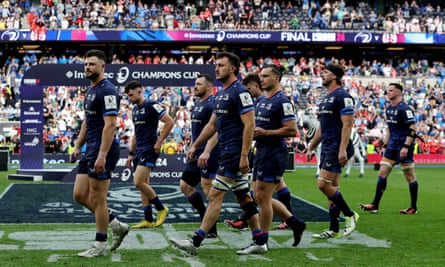Leo Cullen needs to shift focus to attack if Leinster are to end final pain | Robert Kitson
In 2022 it was the Boulevard Michelet in Marseille. Last year it was Lansdowne Road in Dublin. On Saturday evening it was the slightly grittier backdrop of Tottenham High Road, but the post-match pain on the faces of Leinster supporters was wearily familiar. Three points, one point, an extra-time defeat: the margins are desperately slim but the sense of deja vu is growing stronger.
Mix in Ireland’s World Cup quarter-final defeat by the All Blacks and the so‑near‑yet‑so‑far pattern is impossible to ignore. Irish rugby still boasts plentiful talent but the uncomfortable losses are stacking up. As Leo Cullen, Leinster’s director of rugby, acknowledged, not all the postmortems will be sympathetic. “The lads are going to need to show a bit of character now,” he said. “You get a sense of what’s coming … you lose another final and we’ve got to be able to deal with that.”
To some extent it is an occupational hazard of top-class sport. Toulouse are a great side and no club have the divine right to sew gold stars on their jerseys. Leinster remain superior to many other wannabes. But what are their downcast followers meant to do? Shrug their shoulders and await another runners-up medal next year? Or wonder aloud if there might be any underlying reasons why this particular bunch of players continue to fall agonisingly short?
The quality of France’s leading sides is clearly a factor. As with La Rochelle, there is no shame to losing against such classy opposition. The extraordinary Antoine Dupont is an all-time great and the burgeoning Top 14 has claimed four successive Champions Cup victories, with power to add. Toulouse have now won this tournament on a record six occasions and the scenes in the city’s Place du Capitole were suitably euphoric.
But even Leinster’s most loyal fans cannot ignore the obvious. Their team had their chances and didn’t take them. They turned down a string of kickable penalties, were never ahead and were unable to land the late drop goal that would have avoided extra time. Not all of it was down to the fates or an unsympathetic referee.
What has happened, for example, to the attacking shape that once carved defences open under Stuart Lancaster’s tutelage? The modern game is about turning half‑chances into points, thinking smart and not necessarily doing the obvious, and the retired Johnny Sexton’s all-seeing brain remains conspicuously absent.
Instead Leinster now send Jacques Nienaber on to the field as a water boy to try to micro‑manage games. They pick a perfectly decent but limited fly-half to stick to a playbook that grows steadily less ambitious. Rather than grabbing the ball and kicking three points when they cried out to be taken on Saturday, they stuck to a prepared script which, ultimately, failed to exert sufficient scoreboard pressure.

In frenetic, tight games an obsession with control and playing the percentages is not always bearing fruit and other teams are also outlasting them physically. As was the case last season, where they let a 17-0 lead slip against a La Rochelle side who found another gear despite being reduced to 14 men late on, they were also unable to locate a sprint finish when they really needed one.
Toulouse, with Dupont and Jack Willis to the fore, had no such problems in a marathon encounter that, from kick‑off to the final whistle, ended up spanning two hours, 45 minutes.
Dupont did make a couple of small errors but cranked up his performance to a whole different level when it mattered. Leinster had some outstanding contributors – how good was Caelan Doris? – but need a few more players with the ability and aura to shape big games in the way Sexton and Brian O’Driscoll once did.
That steely self-belief is less apparent these days, which may be another reason why the Springbok lock RG Snyman and New Zealand’s versatile Jordie Barrett will be wearing Leinster blue next season. Harsh, perhaps, but it feels like the time to try a different starting 10 and to obsess slightly less about defence at the expense of greater attacking variation.
after newsletter promotion
But Leinster are a sizeable tanker and, as Nienaber and Cullen have been finding, these things do not happen overnight. That nervy Croke Park semi-final – when Northampton almost caught them napping after a poor start – also now feels less like a blip than it did previously.
Maybe the World Cup disappointment is still sapping a few minds and bodies, with Ireland’s defeat against England at Twickenham another potential case study. True, Andy Farrell’s Leinster‑dominated squad still collected another Six Nations title but the tour to South Africa this summer suddenly feels a tougher gig than it did a few months ago.
Either way, from Leinster’s perspective, only a glorious victory in next year’s final – to be staged in Cardiff on 24 May – can now ease the collective pain. Professional sport can be wonderfully fulfilling but, equally, it is a brutal playground. While Leinster still have huge support, significant financial muscle and a steady supply of schoolboy talent, the external pressure is rising.
“There is still a belief that we can do this,” Cullen insisted. In their heart of hearts, though, Leinster’s high command will know that something has to change.
Source: theguardian.com



